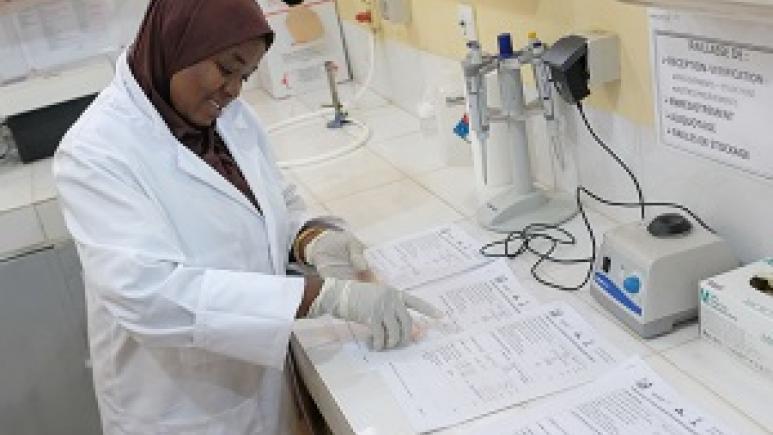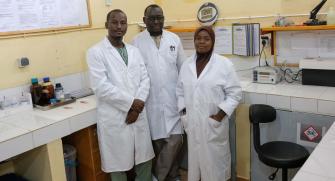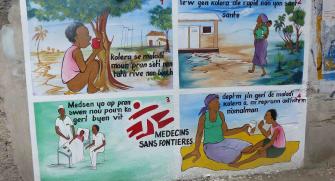How the Covid-19 experience will be used for other infectious diseases in Niger
Niger regularly faces epidemics of meningococcal meningitis, measles, and cholera. There is therefore a network within the country to ensure that these notifiable diseases are detected as quickly as possible. However, the response time is still long," says Bachir Assao, epidemiologist at Epicentre in Niamey, and among other things in charge of coordinating epidemic data for MSF and the Ministry of Public Health in Niger. The analysis of the first samples is a determining factor in the implementation of the response because it allows to confirm the cause and to respond as soon as possible. This response involves several actors, which requires fluid communication and centralization of data and information for a more effective response.
“So I help to link all these actors, explains Bachir Assao. I prepare a weekly bulletin to monitor measles, meningitis and the actions implemented by the ministry and MSF sections in order to have a global view.”
Epicente at the heart of the response to COVID-19 in Niger
So when the first case of Covid was detected on March 21, 2020 in Niger, leading to air and ground closures to limit the spread, MSF foundation, Epicentre, Medic Mobile, Ministry of Public Health of Niger and Google collaborated to set up an electronic tool to organize the receipt and investigation of COVID-19 alerts.
Nearly 5,000 cases have been counted as of March 2 in Niger, the country is on permanent alert for the COVID-19 pandemic. The Epicentre research center plays a key role in this surveillance. Especially since the end of February, the Maradi center has had a molecular biology laboratory equipped with an RT-PCR machine, the technology that makes it possible to identify the genetic material of a virus or bacteria in a biological sample. Initially, this diagnostic technique could be used to confirm the presence of SARS-CoV2 in samples taken from people at symptomatic or asymptomatic risk in collaboration with the Ministry of Public Health and CERMES. But eventually it will be used more widely and for other infections.
"This was a step forward in terms of diagnostic possibilities since Niger has very few functional laboratories to date, and its use will be done in close consultation with the Ministry of Public Health and CERMES,” underlines Ousmane Guindo, responsible of the Research Center.
“We therefore hope to be able to quickly carry out confirmatory testing of cases at the Maradi level, and thus participate in the fight against COVID-19 in Niger," says Céline Langendorf, responsible for laboratories at Epicentre. Moreover, PCR should quickly be used to screen health care workers in Maradi, to complement the seroprevalence study that has just begun on the same personnel. Indeed, as in many African countries, the doubt remains in Niger about the real incidence of COVID-19. Only seroprevalence studies will be able to establish the number of people who have actually been exposed to CoVID-19. The results of these analyses currently underway in several countries are expected to provide a true mapping of the pandemic in Africa.
Alert-CoVid-19 is an electronic monitoring and warning platform in Niger
The strategy to limit the spread of SARS-CoV2 - but it is true for other germs as well - is based on the early detection of symptoms, testing and isolation of infected people as well as people who have been in contact with them and the care of patients.
The first link in the chain is the communities and community relays who are sensitized and responsible for alerting the emergency medical services in case of a suspicious case," explains Bachir Assao.
The SAMU takes information. Having been trained to detect "warning signs", they transfer to a national cell if the risk seems to be confirmed. "The national cell is made up of epidemiologists who can analyze the situation and determine whether a team needs to travel to take a sample or even transfer the person to a referral center. It is a fine coordination between the regions and the national cell in charge of assessing and identifying risks. »
Everything relies on adequate training of the various stakeholders and the collection of alert data in a structured manner to ensure effectiveness and completeness. The Alert-CoVid-19 application allows community health workers, health workers in specialized call centers and hospitals to launch COVID-19 alerts. These alerts are then investigated to identify and test suspected cases.
During the first wave, up to 6000 calls per day were notified. "95% of the alerts go through the platform, for a total of more than 10,000 alerts to date at the national cell level," said Bachir Assao. It is a success and an effective system, hence the desire to extend it to other diseases with epidemic potential in Niger.
“To this end, we have begun an exploratory phase to identify the regions in which we will deploy the pilot phase," Bachir Assao added. Maradi was selected because of the presence of Epicentre and the border regions with Nigeria for the risks in terms of epidemics that they represent.
However, this 2nd phase requires training healthcare staff and community relays in detecting the signs associated with these diseases, as well as strengthening computer tools.
The non-profit organization Medic Mobile is continuing developments to extend the use of this application, and agreements with the various stakeholders are in progress. The arrival of the PCR at the Maradi center will certainly be an important ally in facilitating diagnosis.
“This platform for responding to infectious diseases that occur regularly in Niger and cause the death of many people is a major step forward and should help stop the spread of epidemics such as measles and meningitis.” concludes Ousmane Guindo.








